










“

When the last tree dies, the last man dies” they
the environment and hence human life, and at a time that economies are grossly feeling the harsh outcomes of climate change, the need to preserve our environment and green resources have become even more critic al.
Aside the enviro -friendly outcomes, there is proven economic potential in the green economy,
Recent statistics put proportions of the youth (15 to 35) that are unemployed and seeking work at 34 2percent Unemployment is therefore considered by many to be the most critic al issue
It is trite to say that with the right national and individual orientation, policies, and drive, Ghana’s
millions of jobs to the country ’s teeming youth. Stratcomm Afric a is leading the charge to green
wealth and job creation as well as a sustainable
Now in is tenth year, the annual Garden and Flower Show challenges and motivates the youth and businesses in the sec tor to aspire to grow and reach their full potential, in order to improve their livelihoods and impac t societ y
This year’s theme “Grow th Unleashed” preps the mind of young Ghanaians to burst forth and to grow beyond the norms to achieve a blooming environment
The global horticulture market is estimated to be valued at USD 20.77 Billion as of 2021 and is projec ted to reach US$40.24bn by 2026 at a compound annual grow th of 10 2percent whilst
valued at US$475 6m in 2020 and is expec ted to reach US$725 4m by the end of 2027, growing annually at 6 3percent during 2021 2027

National oil company Ghana National Petroleum Corporation (GNPC) has started the process of assigning its interest in the Jubilee Oil Holding Limited (JOHL) to Explorco -a subsidiary of the company, the Deputy Chief Exec utive of GNPC in charge of Com merce, Strategy and Business Development, Joseph Dadzie, has told parliament’s Ad hoc Commit tee.
According to him, the move is subject to the board’s approval, with the expectation that the assignment of interest will be completed by the end of the year.
The assignment of interest to Explorco is part of the condition of approval by the Minister of Energy for the acquisition of the 7 percent of Anadarko’s stake.
Appearing before the Ad hoc Committee of Parliament hearing
the censure motion on the Minis ter of Finance on Tuesday, Mr.Dadzie stated “When we men tioned to our stakeholders, the other oversight bodies, we thought we were going to buy the stake not the company but obvi ously the structure changed and we had to buy the company, so we going through the process.
Infact the approval we got from the Ministry of Energy was very speci c that it needed to be assigned to Explorco and the board of GNPC is going through the process of assigning that. JOHL will be dissolved when the process is completed.”
The Public Interest and Account ability Committee (PIAC) in its semi-annual report on the man agement and use of petroleum revenues from January to June this year disclosed that the proceeds of lifting by JOHL, should be paid
into the Petroleum Holding Fund, as the committee is convinced the proceeds form part of Ghana’s petroleum reve nue.
Further, the Vice-Chairman of PIAC, Nasir Alfa Mohammed, who appeared before the com mittee to testify, said the money was rather paid into an o shore account.
However, Mr. Dadzie in his testi mony before parliament’s com mittee when the issue of unlaw ful transfer of proceeds of JOHL revenue came up, said the money was paid into Jubilee Oil Holding Limited, which was legally clothed with the authori ty to receive the money.
He, therefore, disagreed with PIAC that the money should have been paid directly into the Petroleum Holding Fund.
Both witnesses were testifying in response to the proponents of the censure motion against Ken Ofori-Atta on the ground of illegal payment of revenues into an o shore account, in agrant violation of Article 176 of the Constitution.

Jubilee Oil Holding Limited, made its rst oil lifting of 944,164 barrels of oil in the Jubilee Field in the rst half of 2022.
The amount was realised from the lifting of 944,164 barrels of oil from the Jubilee elds and
Anadarko CWTP Company in the rst half of 2022.
The GNPC Deputy CEO said it was not the GNPC that set up Jubilee Oil Holding Limited but rather Anadar ko Company.
He said Jubilee Oil Holding Limited was set up because Anadarko decided to sell its stakes in the Ghana assets and reached an agree ment with Kosmos to purchase it.
The Ghana government, he said, then made a submission that it wanted part of that stake, and after negotiations, “we agreed on seven per cent”.
With strict timeliness for the consummation of that transaction and the need for the GNPC to go through the approval process, Mr Dadzie said, Anadarko decided to sell Jubilee Oil Holding Limited, carving out the seven per cent for the GNPC to acquire later on.
“We got the necessary approvals and we were ready to buy Jubilee Oil Holding Limited, so the struc ture of the transaction was not a GNPC-de ned structure but that of the seller (Anadarko Company). “We did not buy a participating stake; we rather bought the compa
ny which held seven per cent in Jubilee and TEN,” he said.
On where GNPC got the funds to buy Jubilee Oil Holding Limited, Mr Dadzie said the corporation wrote to the Ministry of Finance to advance it a loan towards the purchase and obtained approval from the ministers of Energy and Finance.
On the quantity of oil lifted by Jubilee Oil Holding Limited so far, he said: “We have lifted in total $153 million.”
“Jubilee Oil Holding Limited is a 100 per cent subsidiary of the GNPC and we believe it is a com pany registered under the Compa nies Act and obviously the terms and conditions, as well as the constitution of Jubilee Oil Holding Limited, are governed by that act, not the Petroleum Revenue Man agement Act.
“For that reason, 100 per cent of that revenue cannot be paid into the Petroleum Holding Fund. Jubilee Oil Holding Limited must operate, and if at the end of the day it declares pro t and the
directors decide dividends must be paid, that money is paid to the GNPC, which will pay it into the Petroleum Holding Fund,” Mr Dadzie said.
Responding to a question on which of the allegations related to the nance minister, he said: “As far as Jubilee Oil Holding Limited is concerned, the Finance Minis ter is not responsible for the reve nues.”
“Obviously, we have to, at the end of the day, submit our nancials and pay whatever asset tax there
is to the GRA. In 2021, Jubilee Oil Holding Limited paid GH¢17 million to the GRA as tax on its operations.
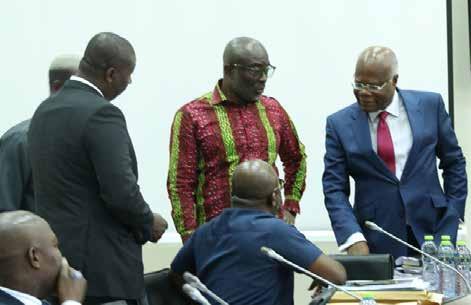
“So, as far as revenue is concerned, I do not think the Finance Minister has any direct control over revenue,” he declared.
Asked if the $100 million was paid into an o shore account, Mr Dadzie said: “Yes, it was paid into an account at the Ghana Interna tional Bank in London by the buyers of the crude.”
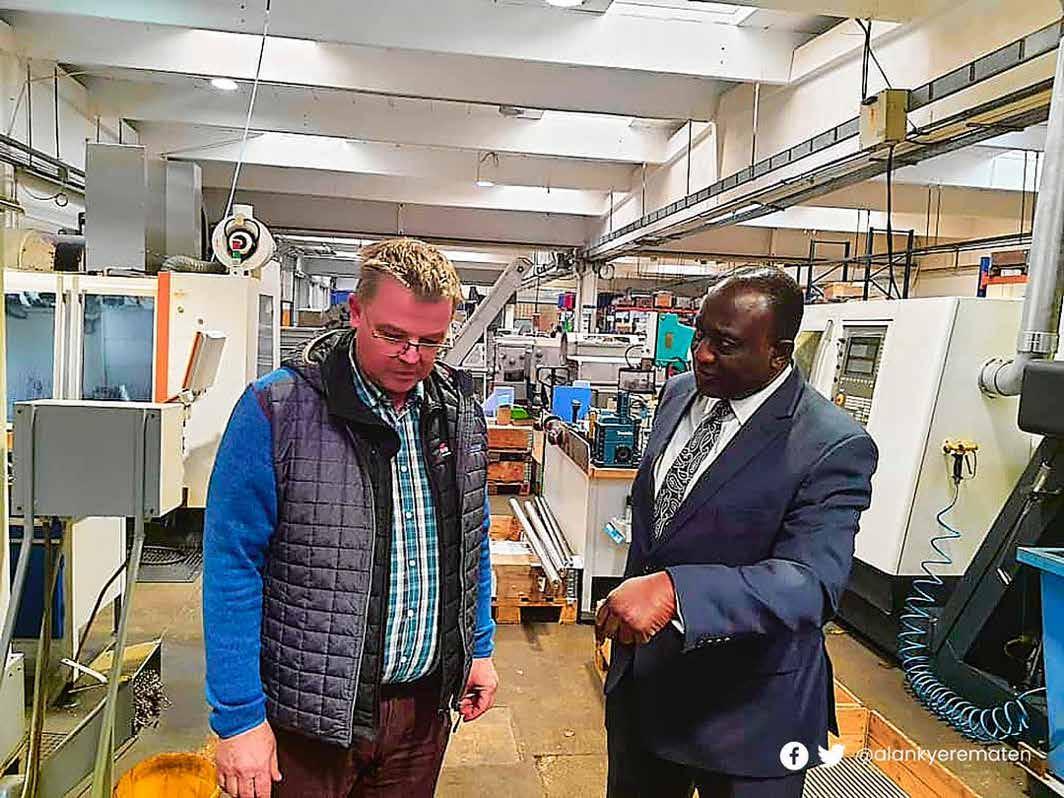
machinery, plants, and equipment and have been very instrumental in setting up plants for some key facto ries under the government’s agship programme.
Mr Kyeremanten paid the visit at the sidelines of the International Machinery Forum 2022 in Vienna, Austria where he attended as a Special Guest.
He had fruitful discussions with the companies on the possibility of establishing their manufacturing plants in Ghana to take advantage of the enormous opportunities under the AfCFTA and also supporting the operationalization of the Technolo gy Solution Centres (TSCs) which is being implemented by the Rural Enterprises Programme and the Ministry of Trade and Industry.
The trade minister was accompa nied by Ambassador Philbert Abaka Johnson, Ghana’s Ambassador to Austria, Mr. Gustav Dovlo, Senior O cial of Ghana’s Embassy in Vienna, and Mr. Martin Woller, Regional Director for Africa & Middle East, Austrian Federal
The Chairman of Parliament’s Trade and Industry Committee, Carlos Ahenkorah, has appealed to market players to consider working on its pricing schemes to enable buyers patronize goods and services at an a ordable rate in a bid to restore con dence in the economy.
Real GDP Growth in Ghana has softened in 2022, as soaring in a tion, tighter monetary policy and a depreciating currency has damp ened private sector con dence, as well as prices of food and services spiraling.
It is in this light that members of parliament’s trade committee urged them to explore ways of stabilizing prices of goods and services.
Speaking with journalists last week after an engagement with o cials of Ghana Union of Traders Associa tion (GUTA) and Association of Ghana Industries (AGI), Ministry of Trade and Industry and the Ghana Chamber of Commerce, Hon. Ahenkorah said “Is an engagement of all people in the trade and manu facturing sector to see how we can fashion a solution to what is happening in Ghana, we have heard from our constituents and how people are complaining about food prices and the general econo my. You could see these were
aggrieved and wanted to vent their spleen.
We have heard them, they have enumerated a lot of problems they are facing, they pro ered solu tions and we are going to put it together in a composite document and arrive at a position paper and present it to government through parliament to see how we can meet them half way.
On their side we have asked them to see how they can make people of Ghana feel relieved by trying to stabilize prices on the market for a little bit longer and see how they can a ect the lives of people and ensuring they are not pressurizing people with what they sell and how they sell them.”
Issue on pro teering, hoarding came up but the market players refuted such assertions on their part.
The President of GUTA, Dr Joseph Obeng stated that the meeting was “long overdue and that for the betterment of the country it was in line to sit at a round table to prof fer solutions to the crisis that we nd ourselves in.”
He added that regarding some policies that may not go their favour, he insisted that for the betterment of the country, they
have to let go. “We are thinking about diversifying trade, amend ment of investment laws that should debar excessive in ux of foreigners in the trading space to derail the e orts of manufactur ing and to destroy local initia tives.”
The President of Association of Ghana Industries (AGI), Dr.Hum phrey Ayim-Darke on his part welcomed the engagement but emphasized that it should be properly structured periodically.
He also indicated that there should be wider consultation in policy formulated which he thinks will inure to the bene t of all stakeholders. “We need to go beyond policy formulation and
see a clear plan from parliamen tarians that represents us, NDPC, Ministry of Finance and the Execu tive, we should focus on the national collective good , not any document that the party manifes to is based on.
Fiscal pressures have remained high. Over the rst half of 2022, the scal de cit reached 5.6 percent of GDP, well above the 3.9 percent target for the same period. Revenues underper formed, as the agship e-levy was introduced late and faced major implementation challenges. As of end-June 2022, public debt reached 78.3 percent of GDP and interest payments reached 54.4 percent of revenues over the rst half of the year.
Renowned International Guide book company, Lonely Planet, has named Ghana as one of the best places to visit and connect in 2023 in its 18th annual Best in Travel list The 2023 edition of the list follows a slightly di erent format than it has been in the past years. Drawing on expert local perspectives from the heart of each destination, the Best in Travel report features cities, countries and regions to aid travel ers planning their next trip.
The research is split up into ve sections — Eat, Journey, Unwind, Connect and Learn — with each place chosen for its topicality, unique experiences, 'wow factor, and ongoing commitment to sustainability, community and diversity.
Ghana made the list as one of the
best countries to visit and connect in the world.
In a statement publish by Lonely Planet, indicated that the ‘Year of Return,’ one of government initia tive launch in 2019, contributed to Ghana’s appearance on the list.
“As the world opened up after long Covid restrictions, many travelers felt the urge to connect or reconnect with others. One way to do that is by looking into our own backyards. People with African heritage may want to head to Accra, Ghana, for their own sense of connection. The country, also on the list, observed a Year of Return in 2019, which brought people from all over the diaspora to Ghana for fellowship and com munity. Just because the year passed doesn't mean that the
sense of connection has gone: Ghana wants to hit a goal of eight million tourists per year”. The statement reads.
Commenting on the list, CEO of Ghana Tourism Authority, Akwasi Agyeman, expressed excitement on Ghana being named as one of the best countries to visit and connect in 2023.
According to him, the ‘Year of Return and ‘Beyond the Return’ were part of government e ort to revive Ghana’s engagement with the African diaspora and the world at large.
He noted that, it did not only increase number of visits to the country but also gain interest from the media, celebrities and investors, that helped position Ghana an attractive investment destination for the diaspora.
“It is a great honour to see how, over the years, Ghana continues to receive accolades for our dedi cation to promote ‘Year of Return and ‘Beyond the Return’. Indeed, we are immensely proud of the fact that Ghana has been named as one of the best places to visit
and connect by Lonely Planet. I also recognize that we could not have come this far without the support of government and all stakeholders.
Heading to December, we have started seeing the numbers coming in and we are very positive that Ghana will host the world once again,” he said.
Last week, The Ghana Tourism Authority (GTA) under the auspices of the Ministry of Tourism, Arts, and Culture o cially unveiled the sched ule of events for the 2022 ‘Decem ber in GH’ campaign.


December in GH is the country’s biggest celebration of all things, Cultural, Entertainment, Adven ture, Nightlife, Fashion, Gastrono my, Tours and Community service.
Since 2019, the ‘December in GH’ event schedule is one that many travelers look forward to when plan ning their activities for their holiday trip to Ghana.
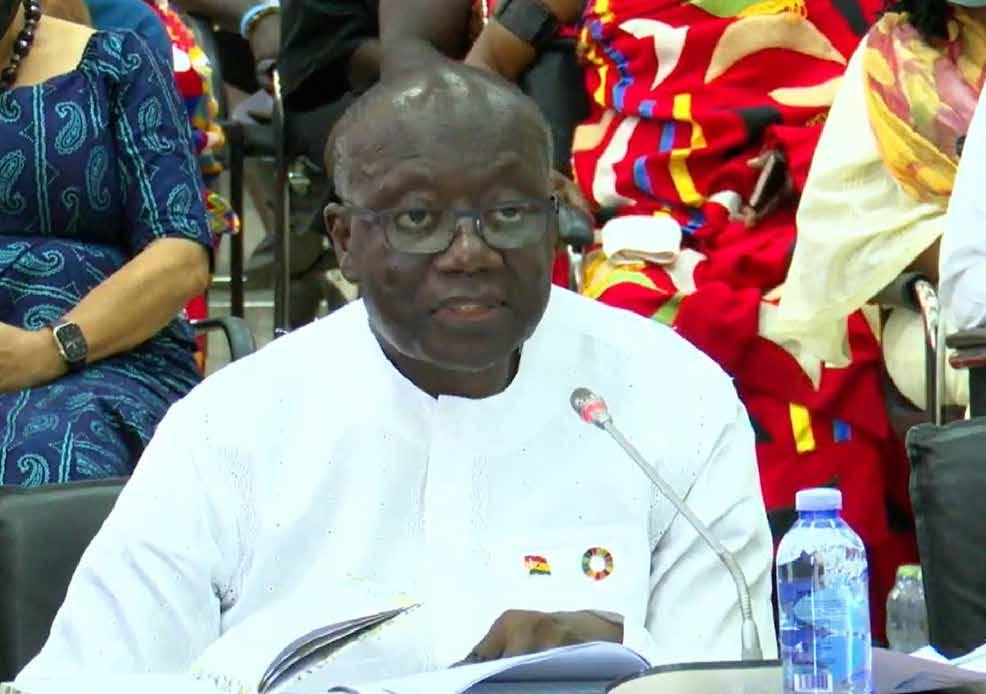
Cathedral were made from the its requirement.
penetration was less than 0.5 per cent of GDP, an indication of the growth potential that existed. The MD of impact Life said the life insurance sector was also less dependent on entrenched brokers, with just eight per cent of life insurance distribution chan nels available compared to 44 per cent in the non-life insurance.
current global and local macro economic situation,” Mr Abudu added.
Approach
He said the company was creating a new and unique brand with a fresh corporate image that re ect ed boldness and cutting-edge services.
merged their operations into one entity to help increase insurance penetration in the country.
The new entity has been named Impact Life Insurance and was unveiled in Accra last Wednesday.
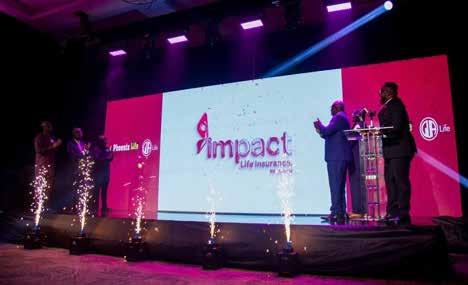
The Chief Executive O cer (CEO) of Impact Life Insurance, Sheri Abudu, described the unveiling of the newly merged brand as the most signi cant and historic one in Ghana’s life insurance industry. He said the merger was the rst in
the industry meant to strengthen ance, solidify retail insurance and less creativity and innovation.
Mr Abudu said Ghana’s insurance industry was one of the most attractive sectors in the country.
“Currently, overall insurance penetration in the country is around 1.1 per cent of gross domestic product (GDP) com pared to about 2.8 per cent in Kenya and a whopping 17 per cent in South Africa,” he said. He explained that Life insurance
“Our industry is also bene ting from two new regulatory develop ments – the expected passing of a new mandatory group life law requiring companies to procure life insurance policies for their employees and the commence ment of annuities.”
“All these present a unique envi ronment for a progressive busi ness like ours to emerge and transform the industry with insights, energy, new blood, dynamism and unprecedented growth.
“It is a challenge of huge propor tions and quite daunting. It is a feat that is historic in its scale and daring in its outlook, given the
The brand, he said, would appeal to young, rst-time insurance customers across the country and beyond.
“Life insurance is probably the most signi cantly important and yet often ignored part of life under the sun.
“We do not need to approach the subject with grim and uncertainty ever again. We are here to change that narrative; transform the para digm shift and provide a ray of sunshine and hope for Ghanaians.
“Impact Life Insurance is not making any promises; we are here to be as focused and as committed as ever to the needs of our custom ers and potential ones,” the MD said.
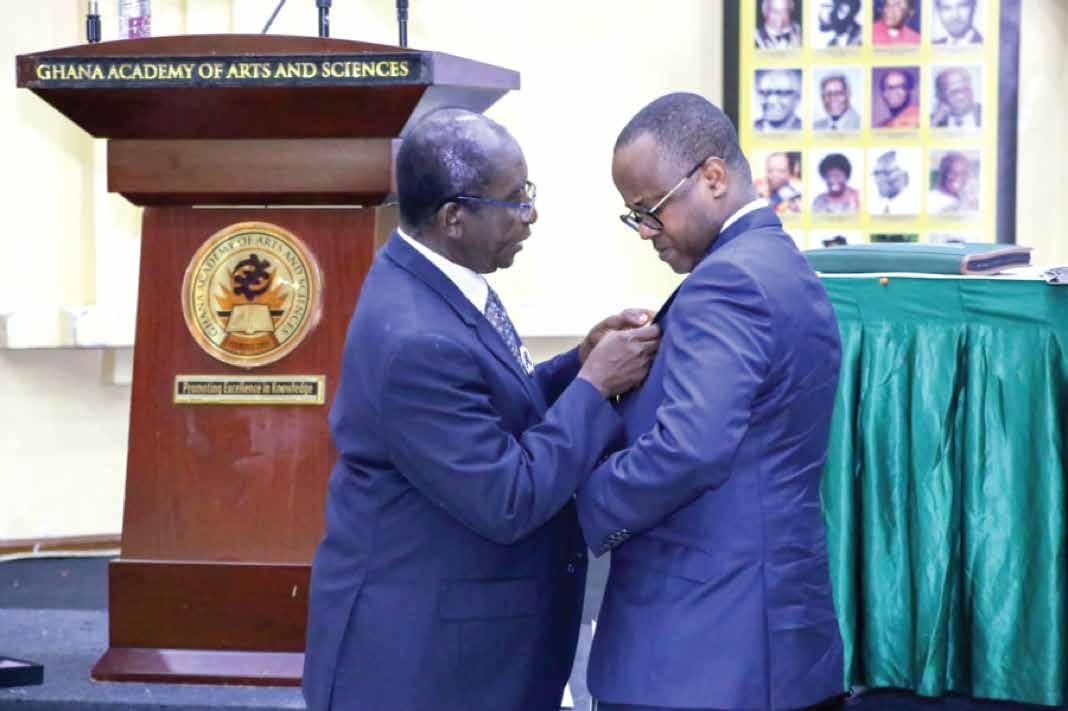
pursuit, advancement and dissem ination of knowledge in all branches of the sciences and the humanities.
elected Fellow of the GAAS on October 20, 2022. Congratula tions”, the Vice- President of the GAAS (Arts Section), Prof. Ko
Speaking after the ceremony, Dr Opoku-Afari expressed gratitude to the President and the council of

The GAAS was founded in 1959 on
It is aimed at promoting the pursuit, advancement and dissem ination of knowledge in all branch es of the sciences and the human ities.
global responses to climate change, consider the three cate gories of climate action: mitiga tion (emissions reduction), adap tation, and migration to better conditions. The sequence here is important, because the challenges implied by each category will become more di cult if less is done in the category preceding it. If we do too little on mitigation, we will need more adaptation, and if we do too little on adapta tion, we will see more climate refugees eeing their increasingly uninhabitable homelands.
The deliberations at this year’s United Nations Climate Change Conference (COP27) suggest that while policymakers realize the urgency of combating climate change, they are unlikely to reach a comprehensive collective agree ment to address it. But there is still a way for the world to improve the chances of more e ective action in the future: hit the brakes on deglo balization. Otherwise, the possibili ties for climate action will be set
back by the shrinkage of cross-border trade and invest ment ows, and by the accompa nying rise of increasingly isolated regional trading blocs.
Deglobalization is being accelerat ed through a combination of old-fashioned protectionism, new fangled “friend-shoring” (limiting trade to countries with shared values), and geo-strategically motivated bans and sanctions. To see why this trend will frustrate
New international agreements are needed to manage each of these problems. But rising geopolitical rivalries will make mitigation agreements more di cult. How can China and the United States agree to meaningful emission cuts when they both suspect that the other’s top priority is to secure an economic, and hence strategic, advantage?
Agreements will be easier to reach and enforce in a world that has not fragmented economically.
When there is ongoing bilateral trade and investment, both China and the US will have more reasons and occasions to talk to each other, and there will be more chips (literally!) with which to barter – a technology transfer here in exchange for an emissions com mitment there, for example. Mutual openness, including the free movement of businesspeople, tourists, and o cials, will also make it easier to monitor climate action, whereas further isolation will only breed more suspicion, misinformation, and mutual incomprehension.
Deglobalization will also hinder the production, investment, and innovation needed to replace carbon-intensive production processes with climate-friendly ones. Consider battery produc tion, which is necessary to store power from renewable energy sources. The key inputs for batter ies – lithium, nickel, and cobalt –are projected to be in short supply within the decade, as are the rare earths used for electrodes. Global
battery production will su er if manufacturers have to “friend-shore” these commodities. After all, most of these resources are mined in unstable or con ict-ridden countries, like the Democratic Republic of the Congo, and much of the existing re ning is done in China and Russia. Yes, some supply chains could be altered over time to pass through friendly countries. But businesses will struggle to determine who counts as a “friend” and who will remain so over the duration of a thirty-year investment. It was not so long ago that a US president raged even at Canada. Moreover, in the short run, reshu ing supply chains would severely limit production capacity and increase costs, reduc ing the world’s chances of keeping global average temperatures below critical thresholds within the narrowing timeframe that we have left.
Adaptation to climate change will also be harder in a deglobalized world. Higher temperatures and changing weather patterns will make traditional agriculture unvi able in many places. New crops and technologies can help, but these will require innovation, investment,
and nancing. Many developing countries outside major regional blocs will be shut out from such ows. And even the most heroic e orts at adaptation will not preserve agriculture’s viability in the tropics. Many farmers will have to look for new livelihoods. The surest way for developing countries to create new jobs is to export, tapping into the depend able demand in more highly developed (and less heat-a ect ed) countries. Yet rising protec tionist barriers in more devel oped regions will impede such growth, thereby limiting adapta tion. Meanwhile, isolation will not necessarily give developed countries the security they seek. While possibly diminishing some political risks, con ning supply chains within one’s own country or region will increase their exposure to climate catastrophes and other risks. Just look at how higher energy costs are currently a ecting all of Europe, but not North America.
Global diversi cation, by contrast, would bring greater resilience. Ideally, a supply chain would have multiple suppliers across di erent regions
and continents in every segment, enabling it to shift quickly from a climate-hit supplier to a supplier elsewhere. Similarly, in the case of commodities, the best insurance is a well-connected, freely accessible global market where disruptions can be smoothed over, and where no producer has undue leverage. The more local or regional the market, the more adversely it will be a ected by severe weather or a malevolent supplier.
If mitigation and adaptation fail, people in badly a ected areas will be forced to migrate. Those in less-a ected regions should not myopically assume that they can continue to live comfortably behind border walls. Not only will the humanitarian tragedy occur ring outside be hard to ignore, but desperate climate refugees will scale or break down any wall. It would be far better to forge new global agreements to direct climate refugees toward the countries that can absorb them, and to provide potential migrants with the job and language training they need to be productive on arrival. Deglobaliza tion will only hamper such e orts. Globalization may have fallen out of favor in recent years, but
preserving it is imperative. Even if countries have a legitimate securi ty interest in restricting trade and investment in strategic and sensi tive sectors, we must prevent these policies from degenerating into isolationism.
At a minimum, the international community should negotiate a Geneva Convention-style pact to create safe spheres of continued global interaction that are protect ed from sanctions and bans in most circumstances. These should include trade in food, energy, medicines, and other essential goods, such as those needed for climate mitigation and adaptation. We should set stringent conditions for denying countries access to the global payment infrastructure and for applying secondary sanctions (sanctions against sanction break ers).
Even if we cannot currently agree on a global climate action plan, we still must preserve the basis for cooperation. There can be no e ective climate action without continued globalization.
All who are traveling to the 2022 World Cup in Qatar and harbor concerns about human rights should come together to protest one especially urgent and heinous recent abuse: the Taliban regime’s prohibition barring Afghan girls from attending school. Anger about the ban is strongly felt in Qatar, other Gulf Cooperation Council (GCC) member states, and other Middle Eastern and predominantly Muslim countries that wield in u ence over the Taliban. The entire global development community therefore can unite around the shared objective of asking the Taliban to honor its earlier promise to respect girls’ right to education. Unity on this issue is possible, because the Muslim world outside Afghanistan supports mainstream Islamic teaching that welcomes and encourages girls’ education. “Iqra,” meaning to read, is the rst word of the Koran. “The seeking of knowl edge is obligatory for every Muslim,” states Al-Tirmidhi, Hadith 74, one of the six canonical teach ings in Sunni Islam. This deep com mitment to learning – by men and women – explains why the United Arab Emirates has been so outspo ken in support of girls’ education at the United Nations, and why Qatar’s leaders have been recognized inter nationally for making the case for education as intermediaries between the West and the Taliban. Moreover, every country has com mitted to the fourth UN Sustainable
Development Goal: that every child be ensured access to “inclu sive and equitable quality educa tion” by the end of this decade. Owing to its own strong commit ment to provide education to all girls, women’s university enroll ment in Indonesia, the world’s largest Muslim-majority country, has increased from 2% in 1970 to 39% in 2018. And in Saudi Arabia, half of university-age women attend university – a higher female enrollment rate than in Mexico, China, Brazil, and India.
The case for reversing the school ban becomes even stronger when one recalls that Afghani stan itself has enjoyed long periods when girls’ education ourished. Before the Taliban’s 1996 takeover, 60% of Kabul University teachers (and half its students) were women, and Afghan women constituted 70% of the country’s schoolteachers, 50% of civilian government workers (and 70% of the 130,000 civil servants in Kabul), and 40% of doctors. In this century alone –up until a year ago – the number of Afghan girls enrolled in school increased from just 100,000 in 2000 to more than 3.5 million, and female literacy doubled.
The UN’s Education Cannot Wait fund (which I chair) has invested more than $58 million in educa tion in Afghanistan since 2017, initially through emergency
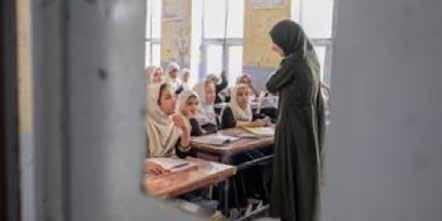
provisions for displaced students, and more recently (until last year) through a multiyear resilience program that was launched in 2019. Owing to the dedicated work of our partners – led by UNICEF and various NGOs – this funding ultimately reached 51% of Afghani stan’s young female students. The plan now is to launch a new multi year program to increase girls’ and boys’ access to community-based education, even in the most remote and challenging areas. That is why the international com munity must now plead in unison with the Taliban spiritual leader, Haibatullah Akhundzada, to amend his rulings, which have extended beyond the ban on girls’ school attendance to prohibit them from public spaces such as parks, gyms, and the country’s popular public fairs. The regime has also stepped up sanctions against women traveling without a male relative. And thousands of female government workers have been
told to stay at home, and have therefore lost their jobs.
Protests against this inexcusable denial of girls’ rights continue to come from the whole UN system, and the foreign ministers of the G7 countries and Norway, together with the European
Union’s High Representative for Foreign A airs and Security Policy, have issued a statement calling “on the Taliban to urgently reverse this decision, which will have conse quences far beyond its harm to Afghan girls.” But it is the GCC, the Organization of Islamic Coopera tion (OIC), and large Muslim coun tries such as Pakistan and Indone sia that can exercise the greatest in uence on the Taliban.
We must call on Muslim scholars to use their religious knowledge to show that the edicts banning girls from secondary school are contrary to the teachings of Islam. And we must ask the OIC and the GCC to use all the diplomatic tools at their disposal to end this burn ing injustice. If there is one goal that all of us attending the World Cup can root for together, this is it. We have a chance to change millions of young lives for the better.
increased independence of Central Banks have helped improve e ec tiveness of monetary policy in the management of in ation and how this e ectiveness di er by the exchange rate regimes. Another chapter explores how the central Bank independence promotes nancial development in Africa by making monetary policy more credible. There is another chapter that discusses credit information sharing institutions and how that has complemented nancial market developments in Africa.
The remaining two chapters in Part III discusses the relationship between monetary policy and risk taking behavior of banks, and also how monetary policy mediates the e ect of banks pricing behavior on nancial inclusion in Africa.
Three chapters on Structured Finance, sustainable nance and Islamic Banking are discussed in Part IV. One chapter discusses how the structure of nance could be employed to respond to the chang ing nancing demands of corpo rate rms and governments. This is then followed by a chapter that looks at the trends in policies, prac tices and challenges of sustainable nance and banking in Africa. The last chapter in this section provides an overview of Islamic banking and nance as an important alternative to conventional models in the face of recent experiences of nancial crisis.
dential regulations and what it means for the likelihood of a bank ing crisis in Africa. This is followed by a chapter that provides an over view of recent developments in banking regulations and supervi sion in Africa. The last chapter in this section discusses the challeng es confronting the adoption of supervisory and regulatory tech nology in Africa.
The global economy is going through a di cult period; one that has been engendered by recent developments, notably the COVID-19 pandemic and the Russian-Ukraine war. Indeed the adverse e ects of the current economic shock is yet to be fully realized. The extent and duration of this adverse economic impact on countries will to a large extent be dependent on the banking and nancial systems. It is not surprising therefore that policymakers, governments, institutions, regula tors and nancial market practi tioners are all working hard to mitigate the adverse e ects of these shocks on the banking and nancial systems.
Thus this recent book on The Economics of Banking and Finance in Africa, edited by two astute nan cial economists and published by Palgrave Macmillan (Springer Nature) – could not have been time lier. It presents a comprehensive resource on banking and nance that students, researchers and prac titioners interested in Africa’s nan cial systems would nd very useful. The book has thirty chapters grouped under seven broad parts. In Part I a broad overview of Africa’s
nancial systems is provided. Additionally, the purpose of the book as well as an overview of the chapters in the book are provided.

Part II of the book has 4 chapters and covers topics related to FinTech, Financial inclusion and Banking Sector Development in Africa. In this part of the book the relationship between in a tion, interest rates and exchange rates in Africa is discussed. Also there is a chapter that looks at competition and market struc ture and how reducing informa tion asymmetry will reduce monopolistic power of the bank ing sector in Africa. Another chapter also discusses how increased nancial inclusion complements banking sector development and stability in the nancial system in Africa. The last chapter in this part of the book discusses the development of FinTechs and their implication for banks and nancial services in Africa.

In Part III, issues relating to Central Bank independence and monetary policy are discussed in 5 chapters. The rst chapter in this part of the book looks at how
In Part V, the banking crisis as well as the implications of global bank ing for Africa are discussed in 4 chapters. The rst of these chap ters looks at the causes, conse quences or e ects of banking failures in Africa. The chapter that follows examines the impact of cross-border banking on the likeli hood of banking crisis in Africa. Another chapter discusses how cross border banking and bank pricing a ects nancial inclusion in Africa. The last chapter in this section of the book discusses current developments, challenges, opportunities and the future of global banking and what their implication are for African banks. Part VI comprise of 5 chapters that treat topics relating to banking regulation and supervision. It starts with a discussion of risk man agement and compliance in bank ing in Africa. This is then followed by a chapter that examines how country-level governance struc tures a ect the relationship between nancial sector transpar ency, regulations and banking stability in Africa. The next chapter then discusses the role that mone tary policy plays in shaping the relationship between macro-pru-
In the last section of the book, Part VII, issues relating to non-Bank Financial Markets are discussed in 8 chapters. This section of the book starts with an overview of the sustainability, growth and impact of micro nancial institutions (MFIs) in Africa. This is then followed by a discussion of the nature and characteristics of insur ance markets in Africa. Another chapter also discusses the role of pension reforms, pension markets and capital market developments in Africa’s pension market. This is followed by two chapters that discusses respectively the stock market developments, and bond market development in Africa. There is a chapter that also discuss es the relationship between private capital ows and energy use in Africa. The penultimate chapter discusses the relationship between foreign direct invest ments and stock market develop ment in Sub-Saharan Africa. The nal chapter discusses how African governments have responded to pandemics general ly, and with emphasis on the Covid-19 pandemic and Africa’s nancial systems.
One concludes by noting that this book is extremely rich as it blends academic excellence with exten sive practical experience. This undoubtedly is one of the most comprehensive books in contem porary times on the nexus between, Banking, Finance and economic development in Africa.
Osei

The SkyTrain is a proven transpor tation technology with successful operations in many countries including Brazil, Bangkok Dubai. It uses a patented Propulsion system that provides entirely silent operation; it low-carbon and o ers highly ener gy-e cient operation, using only watts/passenger kilometer which about three times more e cient than a modern diesel bus, despite providing high station-to-station speeds.
It has very limited impact on environment - no noise, no pollu tion and no congestion and is thus an excellent tra c congestion solu tion in congested urban settings like Accra. Since the Sky Train operates on an elevated runway sited above routine tra c ows, has no impact on day-to-day tra ows unlike other solutions such Bus Rapid Transit (BRT) which contributes to tra c congestion.
It is designed to operate continu ously for twenty-four (24) hours daily and three hundred sixty- ve (365) days per year.
launch of an innovative ntech o ering, which is set to revolution ize mobile money in Africa, aiming to increase nancial inclusion and greatly improve the consumer’s digital user experience.
Called Fintech 2.0, the product was announced at AfricaCom, Africa’s largest technology gathering. The solution will also empower micro, small, and medium-sized enterprises (MSMEs) to digitally transform, and provide service providers with greater business agility. In doing so, Huawei believes it will accelerate industry innova tion and digital nancial inclusion in emerging markets.
he said “Africa Inves informed the Ministry light of the Covid-19 and the travel restric prevailed at the time, technical team could not Ghana to undertake the studies. In this regard
Fintech 2.0 brings value to mobile ntech operators through an extremely digital experience, accel erated innovation, and expedited time to market. In terms of digital experience, the solution’s digital architecture allows operators to ensure that the overall experience is
tailored to every aspect of a customer’s life and combines simple and fast payment and lending.
Additionally, it allows for accel erated innovation by simplifying application development for MSMEs. Developers are able to reuse available industry assets including custom templates and components to rapidly build service applications using the best visual tools with minimal coding.
updates in days.
“We were pleased to announce the launch of Fintech 2.0 at Africa Com”, said Bryan You, Director of Huawei Southern Africa Software Solution and Marketing. “Huawei continues to invest heavily in Fintech research and innovation, creating solutions to help address global challenges and support anticipated future developments.”
ner in the project.
Upon obtaining Board approval, GIIF took up an o er to acquire a ten percent equity stake in the project development company.
Fintech 2.0’s open ecosystem, meanwhile, allows operators to bring apps to market faster. By bringing together API, H5, and mini apps technologies, it ensures that partners can launch the service on a super app within one week and take marketing campaigns from idea to launch within three weeks. With a cloud-native platform, the solu tion supports container/mi cro-service, auto-scaling, and
The cost of the whole project was estimated at US$1.9bn after
“Huawei’s Fintech solution uniquely combines the strengths of agile business development, rapid ly scalable platform, nance grade regulatory and security compli ance and nally, accurate real-time risk control, to safely accelerate digital nancial inclusion, enabling access to the growing digital econo mies for every person and organi sation,” he adds.
At present, Huawei's Fintech solu tion serves more than 400 million users in more than 20 countries.
payment, the solution has helped reduce the economic impact of the pandemic, and in many countries, aids governments in providing subsidies to tens of millions of citizens and education allowances for millions of students. It has also helped create hundreds of thou sands of jobs for women and provided nancial services such as micro-credit to those who most need it.
The Group Head of Marketing Corporate A airs at the insurance group, Hollard Ghana, Cynthia Ofori-Dwumfuo, is the Chartered Institute of Marketing Ghana's (CIMG) Marketing Practitioner of Year, 2021.
Fintech 2.0 aims to build on this legacy and help provide secure, stable, and trusted platforms to ensure the safety and security of mobile nancial businesses. Through its use of advanced connectivity and platforms, Huawei hopes to assist nancial institutions in building digital busi ness processes, implementing digital nancial inclusion services, and achieving sustainable nancial development.
She was honoured at the just-ended 33rd Annual National Marketing Performance Awards ceremony the Labadi Beach Hotel. This year's event was under theme "Creative Marketing Innovation in a Volatile Global Econ omy." CIMG recognised Cynthia leading Hollard Ghana's innovative brand-building e orts. In addition, they cited her for excellence in mar
and
tive crisis communication manage ment to repair the damage. That said, strategic thinking is crucial to the nuances of crisis communica
crisis communication.
Therefore, to prevent hate speech, misinformation and disinforma tion, the government must ensure management.
as a great place to start to put an end to the situation; it must be more cooperative with stakehold ers and the public; it must speak with one voice and ensure consis tent crisis message; it must respond quickly to issues, partic ularly those that have the poten tial to further divide the nation and exacerbate the crisis; it must not attribute the nation's economic problems to the Russia-Ukraine war and the COVID-19 pandemic; it must
Undeniably, the world economy is in a recession, and Ghana is not exempt. The question, how government communication been in these turbulent times?

In a democracy, citizens must not only be aware of the govern ment's policies and activities, but must also participate, when provided with reliable, accurate, and timely information, particu larly in periods of growing economic challenges.
Are the boundary-spanning activities of the government's communication machinery pick ing up the right cues to inform the right communication strate with some demonstrating rage at current events.
Responding to concerns, some
denial response strategy that places the blame for the econom ic crisis on the COVID-19 pandem ic and the Russia-Ukraine war. Ghanaians are tired of it and think the response is lame. What should have been adopted earlier was the rebuilding and bolstering of response strategies to acknowledge responsibility, request forgiveness, and explain ing the situation.
Additionally, reminding Ghana ians of the government's past good works and assuring them that we are all involved in making it better, while soliciting support. Regrettably, the growing economic hardship has threat ened the expectations of stake
not only the nation's economy, but also the safety and moral fabric of the society.
Furthermore, it must ensure that the crisis communication is empir ically tested and theory based. For instance, assess how Ghanaians are responding to the economic crisis and the response strategies being used, and adopt a theory that guides and explains why
others are not.
It is, however, refreshing the Presi dent’s broadcast on Sunday, Octo ber 30, 2022, giving assurance that there was light at the end of the tunnel. It is also commendable that the Cabinet, the Economic Management Team (EMT), and the forex bureaus have met over the cedi depreciation.

Are these engagements enough? The government must broaden such consultations and also consider these crisis communica tion management recommenda tions:

and insurance Cynthia Chartered Ghana's the just-ended Marketing at the and Econ for innovative addition, mar
to Group CEO Patience Akyianu, MDs Daniel Addo and Nashiru Iddrisu, and the larger purple team, especially Elorm Senah and Aviel Benni Derry."
"Marketing insurance is no small feat, especially in this volatile global economy. It requires the right expert to drive strategic brand and customer initiatives that are attractive to target audiences. Hollardite Cynthia has been remarkable at promoting our vibrancy and business purpose. Her impactful work with her team has resulted in our group's excep tional brand growth. Also, her

Cynthia is currently the Group Head of Marketing and Corporate A airs
the average Ghanaian to under stand them and also employ local languages in addition to English to disseminate information; it
by experts, academics, and other key stakeholders. Outright rejec tion in crisis messages give an indication that you are not a listening government; it must be open and honest in crisis commu nication, and take post-crisis measures seriously.
All hope is not lost. The glass is half-full rather than half empty. Instead of focusing on the nega tive, let's consider the positive aspects of life and the things that bring us together.
The writer is a communications professional/member, Institute of Public Relations, Ghana/Ghana Journalists Association. E-mail: raymondbaxey@gmail.com

Lately, very often than not, it is very easy to lose yourself in a lot of the things, it may be from work, family, relationships or just our social inter action, for most of us losing ourselves is not even the worst part, having to deal with issues in solitude and still keep up appear ance is the real struggle. The thing about solitude is, it rarely gives you a choice, you can be surrounded by a number of people but somehow still feel lost.
While it is normal for every person to have days, they feel less motivat ed or simply not in the mood for anything, the magnitude of situa tions has the tendency of sending people into depression, in minimal cases psychology professionals have said that major episodes of depression can last up to 2 weeks or
longer, but this really depends on how our situations play out.
Some people have ability to pull themselves out of these moods easily, is this a special skill they mastered over time? Or do they just know who they are and how to manage themselves on these days?
It is absolutely true that the aver age adult spends most part of their days at the o ce or behind their pcs and smart phones doing some form of work, our jobs have an impact on the quali ty of life and relationships we have. Whether as an entrepre neur or working for an organiza tion, the pressure from work related activities eventually catches up with in the form of stress. You are doing yourself a
great favor if you nd an e ective way to manage both physical and mental stress. Taking time to have self-re ective moments can change your perspective on situations and how you handle it.
Do you think employers consider employee self-management? Or as an employer do you have mea sures in place to ensure your employees are happy in perform ing their roles? it is often up to you as an individual to make sure you nd a balance between your work and social life, this will mean consciously taking steps and engaging in activities that will facili tate or enhance this balance, while this process may take time to master, you are on a path to redis covering your true self by so doing. Experts have recommended steps you may take to make the journey to self-rediscovery easier.
A rst recommendation is to ask your self-questions on how you are feeling in every signi cant moment, identify what your thoughts are about the situation, what emotion you are attaching and what action you are undertak ing in response.it is said that this allows you to reconnect the actions of your mind and your body.
Connecting with your true self in rediscovering yourself means you re ect on your thoughts amongst the many con icting and confusing
ones and pursue the thought you most connect with.
Where does this end really? there is no true point of reaching self-dis covery, our daily interactions with our associates, clients and family continues to invoke reactions we may not know we are capable of, however by applying the funda mentals of understanding yourself you take control of your actions and reactions. With the dynamics in our experiences as people there are di erent approaches to reach ing that state of mental and self-awareness, to some taking a break o work activities alone does the trick while some may require some level of support, there is no de ned way of getting there and that is why knowing what works for you is always helpful.
Paramount in all of this is the peace that comes with nding the right balance in all aspect of your life, work and personal life have a relationship, they each have the tendency to severely impact each other hence the importance of being self-aware. When you are at a place of peace with your life and within yourself, your thoughts, actions and emotions align with what your true self wants and maybe that is where you can say you have found your way home.
Overtime is any work done beyond the regular working hours in a contract of employment. In today’s working environment most organi zations work eight (8) hours per day,40 hours per week or some even run 12-hour shift. Overtime is mostly the extra hour’s work done by the employee outside the work ing contract. An allowance is usual ly payable to the employee for the extra time spent at work. There are many reasons for over time at workplace some of which include inadequate human resourc es, this situation negatively a ects e ciency, sta rationalization may be adopted as a strategy to enable organization meets certain targets. As a result, there may be an urgent need for employees to work beyond the agreed working hours stipulated in their respective contract of employment. If this occurs, man agement and employees would have to agree on the duration of overtime services needed to achieve set targets.
In addition, obsolete resources slow production. Mostly when machines used at the workplace are old, its
e ciency is a ected which nega tively in uences productivity. This brings about delay in production at the workplace as well as reducing employee output and overall organization al performance demanding employees to do extra hours work.
Furthermore, in situations of special assignments, overtime is needed and is paid to cater for such tasks that may require employees staying beyond the required working hours.
Finally, using many manual procedures at work leads to overtime. Most organizations employ the use of manual work in its operation hence end up not meeting assigned task or target because the manual e ort is insu cient and ine cient in accomplishing task on time to meet management expectation.
There will be more demand of overtime allowances by employ ees, which leads to increase income resulting in increased productivity. Some employees intend to do overtime to earn the
admiration of management to be considered for a higher position, the allowance paid for overtime serves as attractive package for the employee. Employers using over time are also likely to impose too much pressure on their employees which can cause serious health challenge on them. The employer will then have to incur higher employee medical bills leading to high budget for the employer if is not well managed.
If the amount paid for overtime is not well negotiated by the parties involved, in many instances, mostly employees have con ict with their employers on the amount to be paid if it is not clearly stated in the terms of the contract of employment on extra hours work.
Employees are likely to be e cient during the extra hours worked as compared to their normal working hours because they expect to have an additional income from over time task. Hence, they may relax their working hours task with expectation to work into extra hours, for overtime. Employers
should replace obsolete machines that may cause delay in production and not exhaust employees’ e orts and which a ects employee’s health, safety and reduces their productivity, performance and increase the workplace accident a ecting organizations overall performance.
Overtime means time worked in addition to one’s normal working hours. Every employer considers overtime as very expensive and for that matter allow overtime as and when its expedient. In summary overtime is used to clear backlogs or to accomplish task that is time bound. Employers are naturally not in favour of overtime since it increases their wage bill reason why it is used sparingly.
Nevertheless, most employees prefer over overtime since their income will increase when they work overtime. For management overtime needs to be managed prudently to achieve the desired results else it will lead to lackadai sical attitude in e ective employee time management.
AUTHOR:LADY JULIANA AMOAH EMAIL: jupee295@yahoo.com

Advisory and Consulting – work place strategy, technology services, valuations, consulting,
JLL, a leading professional services rm that specialises in real estate and investment management, has been named the Top Property Services Group at the 6th Annual Africa Property Investment (API) Awards 2022. The rm was award ed for its achievements including technology innovation, sustainabili ty, and successful diversi cation and execution of deals and services across the real estate sector over the past 12 months.
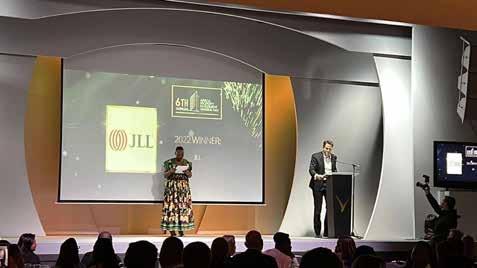
During that period, the company has worked across all major real estate services and sectors on the African continent, including Capital Markets, comprising investment sales, debt and nancing arrange ments; Leasing – full-service broker age between tenant and landlords; Property and Facility Management –Management and outsourcing of properties and real estate portfoli os. JLL has also been involved in
"Having the range and depth of expertise within JLL Africa as the only independently and fully owned global player on the continent is a tremendous asset," said Peter Harris, JLL’s Co-CEO for sub-Saharan Africa and Maghreb. “We are deeply honoured to have received this award. It has rea rmed our conviction that with this level of regional expertise and global insight, we can positively contribute to the future of Real Estate in Africa."
The company has also undertak en Project & Development Services – Design and manage ment of real estate projects including t out services, as well as research across sectors and regions in Africa. JLL delivered these services across 30 coun tries on the African continent in the last 12 months.
The API peer-to-peer awards were established to recognize and promote excellence in Africa’s rising real estate sector and have become a critical benchmark for measuring success for the industry.

JLL prides itself on being able to deliver at scale to both multina tional clients with large footprints, as well as local
clients. In the past 12 months, the company completed 75 assets and executed $490 million capital mar kets transactions by deal value.This included advising on the largest integrated logistics facility ever in Africa (DSV logistics facility in Pomona, Johannesburg) at the start of 2022. Another standout was taking to market a 62-asset portfolio comprising retail, o ce, and industrial assets to market on behalf of South Africa's largest pension funds; 311’000 square metres leased on the continent. JLL’s Hotels & Hospi tality Group has been ranked as the leading hotel investment sales advisor since 2015.This was again achieved in 2021.
Sustainability is a core pillar of “Beyond”, JLL’s strategic vision to position and equip it to always provide consistent, best-in-class service to its clients, and to drive strong and pro table long-term growth to the bene t of all its stakeholders. In support of
this, the company has invested signi cantly into its sustainability products and services and the upskilling of its sta . The compa ny’s determination to be at the forefront of our industry is best illustrated through its ambitious NetZero Carbon target. In 2021, the Science Based Targets Initiative (SBTi) certi ed the company’s existing target to its new Net-Zero Stan dard, placing JLL among a select group of companies to align its net-zero commitments with climate science.
The company also implemented a South African led Design and Build Sustainability Code and rolled it out on all client projects – the rst of its kind.The easy-to-use app allows input of project data and tracking of sustainability markers throughout the build lifespan. JLL also hosted Africa’s rst ESG and hospitality investment forum and ters to a fully sustainable green
things. The reasons for capital injections vary, yet the bottom line is that, at a point in every business, funding is a key element.
While businesses of all sizes require funding, the sources and opportunities for such funding di er. Large businesses frequently have a wide range of nancial support alternatives available to them.
ners has been at the forefront of supporting multiple SMEs in Ghana and across the African sub-region to access funding for their busi nesses.
What’s an SME?
It is widely acknowledged that an SME is di erent from companies that are primarily used by their owners as vehicles for self-employ ment.

Small and medium-sized business es (SMEs), which make up a signi cant portion of rms in Africa, are the backbone of the global econo my.
SMEs are thought to account for 90% of the private sector in the developing world and for 80% of jobs on the continent of Africa, making them a signi cant force behind economic progress.
It’s no doubt that funding or nanc ing of businesses has been identi ed as a top bottleneck for businesses of all sizes, irrespective of location, region, and or industry.
This is supported by centuries of surveys conducted to ascertain the challenges that businesses face.
All businesses, regardless of size, require cash to cover ongoing oper ating expenses, build infrastruc ture, and for marketing, R&D, and client acquisition, among other
But for small and medium-sized businesses (SMEs), obtaining conventional funding can be extremely di cult and even fatal.
The focus of this article is to build a pipeline of funding opportunities that SMEs could explore to meet their short-, medium-, and long-term funding needs.
Fortunately, Annan Capital Part-
A business is considered a small- to mid-size organization (SME) if its revenues, assets, or workforce are below a speci c threshold. Unfortunately, there isn't a univer sally accepted de nition of a SME. Each nation is free to choose its own de nition and may also opt to impose particular restrictions on particular businesses. The stan dards for classifying a SME di er between nations and occasionally between industries.
Abor and Quartey (2010) claim that the SME sector makes up the majority of rms in Ghana, accounting for over 92% of all busi nesses.
In addition, it was predicted that in 2018, SMEs contributed an estimated 70% of Ghana's Gross Domestic Product (GDP), or around 90% of all enterprises that were in operation. Close to 85% of jobs in Ghana are reportedly provided by this industry.
It is impossible to overstate the importance of SMEs to the stability of any economy, especially, that of Ghana and the rest of Africa.
Numerous studies about the prima ry forward-thinking function that SMEs play in every economy have been conducted in both developed and developing nations.
For these enterprises to grow, create more jobs, and generate economic growth, they need access to funding opportunities.
The owners of SMEs frequently gripe that a lack of funding prevents them from expanding and fully using lucrative investment pros pects.
The "funding or nancing gap" refers to this di erence between the nancing options available to small and medium-sized businesses and the nancing they could e ectively employ.
There are quite a lot of potential funding sources for SMEs. However, a lot of them have real-world issues that can make them less bene cial.
The ideal scenario, according to many SMEs, is to never need to raise money; instead, the business would support its own initial start and expand going forward at the rate at which it makes money.
Many SME CEOs who don't want to answer to outside investors nd this strategy to their liking. And the successful consequence is typically a stable business with little growth.
Let's begin by exploring some of the funding gateways available to SMEs as they set out to fund their busi nesses.
This is always the rst attempt and source of funding for SMEs. Even before receiving external funding, you are typically asked how much of your own resources you initially invested in the business.
Due to the fact that these individu als' (family and friends') motivations for investing may not be solely nancial, they may be ready to accept a lower return than many other investors, making this a potentially excellent source of fund ing.
The main drawback is that, for the majority, the ability to raise money from friends and family and on our own is relatively constrained.
Bootstrapping is the practice of launching a business using only one's own nances, together with money borrowed or invested from family or friends and revenue from the rst few sales.
Self-funded rms do not rely on conventional nancing techniques like bank loans, investor money, or crowdfunding. Instead, as the name implies, business owners must "pull themselves up by their bootstraps" by starting with their own money.
Bootstrapping is the best place to
start for new businesses, espe cially if market validation of their goods or services has not yet been completed.
The bene t of this approach is that the SME owner retains total control. Since it shows the owners' faith in and dedication to the company, it might also beused to persuade investors to join.
Angel investors are people or organizations who make invest ments in start-ups or early-stage businesses in exchange for an equity ownership interest.
However, securing an angel investor is only half the battle. Once you've connected, you'll need to sell your business to investors.
One drawback is that these people are uncommon and frequently very picky about what they are willing to invest in.
Once a business angel expresses interest, they can be of consider able assistance to the SME because they frequently possess excellent commercial judgment and are likely to be connected to a wealth of resources.
Angel investors may be relatives or family members, but they are mostly outsiders eager to support start-up businesses with creative ideas.
Some of the angel investor networks in Ghana/Africa includes the following:
•African Business Angels Network
•Accra Angels Network
•Ghana Angels Investor Network
Venture Capital (VC)
Most people undoubtedly picture VC when they think of early-stage nancing. Some investors will put money into a new business, while others may wait until it has been operating and proving itself.
A venture capitalist rm is very often a subsidiary of a company that has signi cant cash holdings that they need to invest in. The venture capital subsidiary is a high-risk, potentially high-return component of their investment portfolio.
These companies invest quite a signi cant amount of capital into a SME and have already performed market research and generated initial sales.
In return, they receive stock in the business, which entitles them to a seat on the board and a voice in its operations. The injected capital may occasionally be set up as a convertible debt.
A presentation to a venture capi talist must demonstrate how they would be able to "exit," or release their value, after a number of years, as these inves
tors rarely wish to remain invested for the long term.
in the form of a business plan, and asking for funds under a set of rules and regulations.
This is frequently accomplished by either selling the business to a larger rm engaged in the same industry or expanding it to the point where a stock market listing is feasible.
An SME needs a business idea that could generate the high returns a venture investor is looking for in order to get venture capital fund ing.
Invoice factoring is a type of accounts receivable nance that is also known as "factoring" or "debt factoring". Invoice factoring enables businesses to sell outstand ing invoices (accounts receivable) to a third-party commercial nance company (a factor). These sources of nance e ectively let a company raise nance against the security of their outstanding receivables.
This funding is only temporary and frequently costs more than an overdraft. One advantage of these sources of funding, though, is that when a SME expands, their exist ing receivables will expand as well, increasing the amount they can borrow from their suppliers or through invoice discounting.
Therefore, factoring and/or invoice discounting are two of the extremely limited number of nan cial sources that expand on their own in tandem with the expansion of the business.
Loans & Bank Finance
Here, a business borrows money from an individual, a micro nance organization, or a bank that must be repaid with interest after a certain amount of time.
When a loan can be securedagainst signi cant assets like land and buildings, banks may be ready to o er some type of overdraft as well as long-term loans.
Accessing loans can be challenging, particularly when collateral is needed. But thanks to technology, it's now simpler to get unsecured loans through mobile-based services.
Crowdfunding is a method of obtaining outside money from a big audience as opposed to a limit ed number of specialized investors (such as banks, business angels, or venture capitalists), where each person contributes a small portion of the desired funding.
The contributions are then given a reward by the company, which may take the form of gifts, special o ers, or even stock.
When it comes to crowdfunding, individuals provide the funds that the business requires. Crowdfund ing typically occurs through specialized networks, particularly the internet, with the business owner outlining the activities and goals of the company, sometimes
With regard to traditional types of nancing, this constitutes the main novelty of crowdfunding because it allows business owners to access big audiences' savings without the need for a middleman like a bank.
Agoo Africa Crowdfunding
Coming highly recommended as an e cient crowdfunding platform for small businesses and start-ups in Africa is the yet to be launched
Agoo Africa by Annan Capital Part ners.
“Agoo Africa is a crowdfunding platform for African early-stage start-ups’ and small traditional businesses.”
“When launched, it will allow owners of such businesses to make their project and their pitch acces sible to a large number of inves tors, from young non-professional business angels to established international funds.”
“On the other hand, any investor can now have access to a curated database of small Ghanaian com panies from various sectors and invest in them seamlessly via our platform.”
Another distinguishing feature of Agoo Africa is that, unlike most of the existing equity crowdfund ing/crowdinvesting platforms, Agoo doesn't require your startup to be incorporated in Delaware.
On the contrary, it's the rst such platform which clearly encourages fundraising for companies regis tered in Africa.
When to Raise Finance
When you're not in need of fund ing is the best moment to begin looking. On-boarding new inves tors requires time, especially if they are corporate investors like venture capitalists (VC) and or even angel investors.
Utilize every opportunity you get to inform potential investors about your company, your vision, and what makes it special. This will ensure that they have heard of you and, ideally, are familiar with your narrative when you approach them later to discuss a fundraising e ort.
Annan Capital Partners, bringing on board decades of experience in connecting multiple SMEs across the African region to funding opportunities, will be an ideal partner in your quest to fund your SME.
Paul Frimpong, CGIA, ICCE
Paul Frimpong is a development economist, top voice on Sino-Africa relations, and an award-winning entrepreneur.
He’s currently the Global Head of Strategy & Membership at the Institute of Certi ed Chartered Economists (ICCE).
This article is originally curated for and published by: Annan Capital Partners.
Annan Capital Partners (ACP) is a boutique investment advisory and business development agency o ering holistic wealth management and venture building services to a wide range of clients, from entrepreneurs to governments and from local SMEs to global corporations.
https://annancapitalpartners.com/ py.frimpong90@gmail.com
Some few years back, The Ghana Tourism Authority under the auspices of the Ministry of Tourism Arts and Culture out doored the “See Ghana, Eat Ghana, Wear Ghana, Feel Ghana” campaign in a bid which also aimed at igniting the “I am Ghanaian Spirit”. A friend of mine a very proud Ghanaian indeed is a supporter of the super eagles of Nigeria. He is very serious about it and keeps cheering them anytime they play. I’m still trying to conceive and understand how a Ghanaian can disown Ghana black stars for the supper eagles of Nigeria. Maybe somebody can help me understand the psychology behind this behaviour. Anyone may choose not to support the black stars who indeed won yesterday for whatever reason, however, to support anoth er country rather than Ghana, it’s tantamount to lacking the “I am Ghanaian spirit”.
The Ministry of Tourism and Creative Art and the GTA deemed it necessary to come up with this concept perhaps because some Ghanaians today do not possess the “I am Ghanaian Spirit” and they believe it’s a challenge and there is a need to conscientize the public. It’s important that we begin the education from the basic level through the secondary and tertiary levels. On September 21st this year, we celebrated DR. Kwame Nkru mah’s birthday. The unfortunate thing is that many Ghanaian school children have never being to the Kwame Nkrumah Mausoleum and do not know about the works of Dr. Nkrumah. I heard it’s closed for renovation. This is just one of the many challenges we face in promot ing the domestication agenda. One may argue that they do study about him and other great Ghanaian men and women in school yet how many of these kids have ever visited and seen the resting place of this great Ghanaians. How many museums have we built in their honor? Again, it’s unfortunate that we have dedi cated a holiday in his memory yet many Adult Ghanaians have also never visited the Nkrumah Mausole um. By the way, I’m told the British are the ones who have the copyright over his book? The reawakening of a sense of national pride must begin with the basic school incorporating the learning with the seeing and feeling.
1. Seeing and feeling Ghana Research has shown that seeing is a very e ective way of learning. Seeing Ghana basically means travelling around the country to see and experiencing the di erent cultures and tourist attractions. This can be achieved by organizing excursions for pupils and students
each term or semester. The choice of the attractions must be one that should be carefully selected, educative and enter taining. Tourism clubs must also be set up in all schools as a means of encouraging domestic tourism. I have seen school children going to the parliament house to observe debates in the house. This experience can keep a lasting memory on the mind of these pupils thereby, encourag ing them to be future parliamen tarians. Excursions to such places must be encouraged. In planning these excursions, the right things must be done. Many a times, school authorities do not consult the experts when plan ning these excursions. They overload the kids in the buses neglecting safety measures and procedures. I believe we all remember the Kintampo falls disaster. There are procedures to follow before taking students/pupils out on excur sions. I wrote articles in the past on best practices elsewhere. One of these procedures is to inform Ghana Education Service in writ ing and receiving their written permission. A school head told me when they write these letters seeking their consent, the reply sometimes come after the date of the trip. If that were the case, those in charge must be more proactive.
The type of vehicle, the particu lars of the driver etc are all very important things to consider. Again the insurance cover of the vehicle does not support over loading and the overloading must stop. Parents must also be informed and obtain their writ ten permission before allowing their kids to join these excur sions. As I mentioned earlier on, many schools ignore these procedures and parents must ensure they do the right things because they are the future lead ers and we need them alive.
Another important aspect school authorities keep ignoring is acquiring the services of tours guides. They are trained to tell the right stories and educate their audience on the various attractions along the way. Tour guides are exible and may not charge so much therefore let’s involve them. It adds beauty to the excursion. As parents, we need to often plan some tour with our kids. It leaves lasting memories on their minds and will encourage the “I am Ghana ian spirit”. We also need to take our holidays in Ghana and stop going to Dubai and the likes. If we spend our money in Ghana, our economy will be strong and our currency will appreciate.
UNWTO date has con rmed that domestic spending is the determi nant in propelling the top tourism income receiving countries in the world. Touring is not and expen sive activity. It’s all about planning and saving. Many tourists who travel around the world are not rich people. They save towards their holidays sometimes years before they eventually embark because they deem it a need. Eat Ghana
Schools must ensure our pupils and students eat what are grown locally. Whiles in Achimota, school, we had our own farm and I believe the food we ate was from the farm. Do schools own farms and grow their own food? Domesti cations must mean we eating local ly made rice, maize, tomatoes, okro, beans and so on. If we keep importing oil, tomatoes, rice, beans etc, to feed our school children I’m afraid the economy of Ghana will not be as we all wish. If our balance of payment will be favorable, we need to export more than we import. This is basic economics. “I am Ghanaian spirits” must lead our children to be proud of Ghanaian foods and ignore the pizzas and shawamas. The western diets are not the way to go. “If we eat what we grow, it will create a ripple e ect in the economy as a whole and that will be bene cial for the entire country,” It will also enhance the business of farmers and those in the supply chain. I was doing some research as to how historically Ghanaian diet has been. This is what I found. The basic diet consists of a starchy staple eaten with a soup or stew. Forest crops, such as plantain, cassava, cocoyam (taro), and tropi cal yams, predominate in the south. Corn is signi cant, especial ly among the Ga, and rice is also popular. The main dish is fufu, pounded plantain or tubers in combination with cassava. Soup ingredients include common vege tables and some animal protein, usually sh, and invariably, hot peppers. Palm nut and peanut soups are special favorites. The main cooking oil is locally produced red palm oil. The north ern staple is millet, which is processed into a paste and eaten with a soup as well. Indigenous diets are eaten at all social levels, even by the Westernized elite. Talking about Palm nut. Did you know that the Malaysians learnt about palm not from Ghana? Today they are the second leading producer of palm not in the world. Ghana is 12th behind countries like Nigeria and Cote D’ivoire. The Malaysian Palm Oil Board (MPOB) is a government agency responsible for the promotion and development of the palm oil sector
in the country. The country's palm oil industry produces about 90 million tonnes. Humans used oil palms as far back as 5,000 years. In the late 1800s, archaeologists discovered a substance that they concluded was originally palm oil in a tomb at Abydos dating back to 3,000 BCE. Palm oil from E. guineensis has long been recog nized in West and Central African countries, used widely as a cook ing oil. European merchants trad ing with West Africa occasionally purchased palm oil for use as a cooking oil in Europe.
Palm oil became a highly sought-af ter commodity by British traders for use as an industrial lubricant for machinery during Britain's Industrial Revolution. Palm oil formed the basis of soap products, such as Lever Brothers' (now Unilever) "Sunlight" soap, and the American Palmolive brand. By around 1870, palm oil constituted the primary export of some West African countries, although this was overtaken by cocoa in the 1880s with the introduction of colonial European cocoa planta tion. There were few cases of chronic diseases in Ghana about 60 years ago, because we depend ed on our palm oil and palm kernel oil. Since we started importing all the bad oils and cooking using these oils, we are now exposed all kinds of heart diseases. Diabetes is also on the increase because of the change in diet and consumption of unhealthy drinks. According to World Health Organization, 625 Million people will be infected with diabetes by 2040. That means every year 20 million new cases will be recorded. It now reported that there are kids with diabetes. Let’s go back to the basics and ensure our kids are fed the Ghana ian dishes.
One of the objective of the wear Ghana campaign is to promote locally made fabrics and business es. September has been dedicated as Wear Ghana month. Under no circumstances must schools heads purchase fabrics made in China or other countries. If we continues importing and buying from other countries we already know the e ect on the national economy. Eventually, local industry and businesses will continue to collapse. We must not only wear Ghana on Fridays alone but all other days of the week. Times will be harder and harder if nothing is done to stop the trend. The brain drain will continue and there will be no hope for our school children. You can’t teach an old dog a new trick as the saying goes, therefore the focus must be on the school children who must be taught the high sense of patrio-
tism, by seeing Ghana, eating Ghana, wearing Ghana and feeling Ghana. The “I am Ghanaian spirit” can happen and will happen with them. Tuesday was World Tourism Day and this is what the Secretary-General, UN said
“World Tourism Day celebrates the
Destinations Management and Marketing Company based in Ghana and with partners in many other countries. Please contact Philip with your comments and suggestions. Write to forealdestinations@gmail.com / info@fore aldestinations.com. Visit our website at www.forealdestinations.com or call or WhatsApp +233(0)244295901/0264295901.Vi sist our social media sites Facebook, Twitter

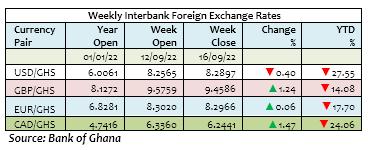










November 18, 2022
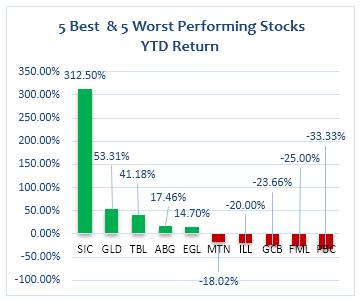
Q3, 2021 GDP Growth 3 3% Average GDP Growth for 2021 3 3% 2022 Projected GDP Growth 3 7% BoG Policy Rate 22 0% Weekly Interbank Interest Rate 22 05% 33 9% 28 5% 5 0% 6 6% 393 4% 78 3%
The Ghana Stock Exchange closed lower for the second consecutive week on the back of price declines by 7 counters The GSE Composite Index (GSE CI) lost 8 49 year-to date (YTD) loss of 10 38%. The GSE Financial Stocks Index (GSE FI) also lost 5 52 points (-0 27%) to Market capitalization declined by 0 13% to close the YTD decrease of 0 15%. preceding week



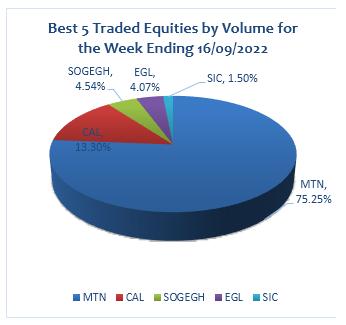

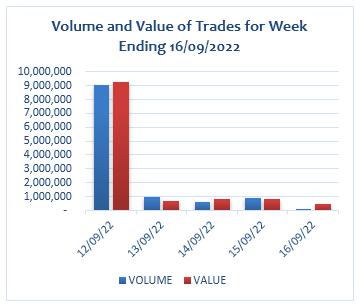
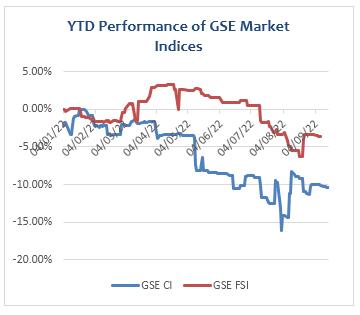
MTN dominated both volume and value of trades for traded respec tively The market ended the week with no advancer and 2 decliners as indicated on the table below
The Cedi continued its downward trend against the USD for the week It traded at GH¢8 2897/$, compared
YTD depreciations of 0 40% and 27 55% respec tively ago
The Cedi however strengthened against the GBP
YTD depreciation of 1 24% and 14 08% respec tively This
The Cedi also strengthened against the Euro for ago The Cedi again strengthened against the Canadian
YTD depreciation of 1 52% a year ago

Ofori-Atta has said that the time had come for Ghanaians to advance reforms and unleash local produc tion capabilities.
According to him, the country could no longer continue to import goods from other countries, saying the ministry would continue to work with relevant regulatory authorities to reverse the trend.

The minister noted that, the chal lenges the nation was currently facing were daunting and that “the exigencies of the moment have forced us to turn this crisis into an
short-term challenges and the long-term structural problems that have inhibited our econom ic transformation”.
He made this known when he addressed members of the Asso ciation of Ghana Industries (AGI) at a high-level meeting in Accra.
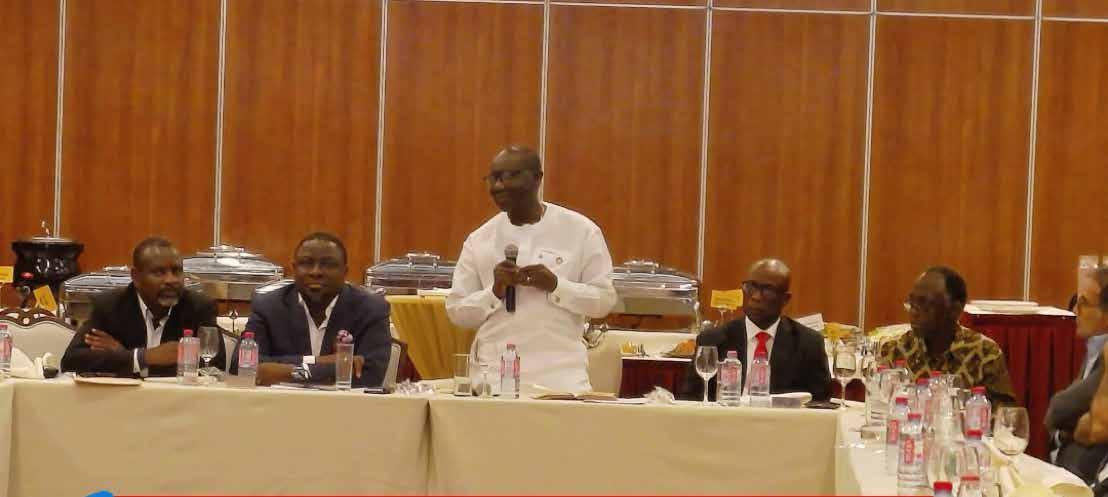
Mr. Ofori-Atta reiterated the President’s call for reduction in over dependence on imported goods and enhance our self-reli ance and added that “Clearly, the time has come for us to put in place the foundations that would
bone of our resilience and structur al transformation”
Giving statistics to buttress his claim for a shift from importation to local production, he disclosed that, between 2017 and 2020, Government spent as much as GHS 6.874 billion on the importation of rice, GHS 3.993 billion on sh, GHS 1.881 billion on Chicken (pro cessed), GHS 487 million on meat, GHS 281 million on vegetables and an estimated GHS 184 million on Poultry.
He rea rmed the government's
industries in producing more import substitute products such as rice, poultry, vegetable oil, tooth picks, pasta, fruit juice, bottled water, ceramic tiles, and others.
On the cedi depreciation, the Minister underscored the need for all to support Government’s drive for import substitution as that could lead to stabilization of the cedi and commended the AGI for the continues support of policies and initiatives that supported the local industries.